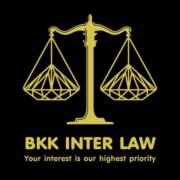Best Drug Crime Lawyers in Don Mueang
Share your needs with us, get contacted by law firms.
Free. Takes 2 min.
List of the best lawyers in Don Mueang, Thailand
About Drug Crime Law in Don Mueang, Thailand
Drug crime laws in Don Mueang, a district in northern Bangkok, fall under the national legal framework set by the Kingdom of Thailand. Drug offenses here are governed by the Narcotic Act B.E. 2522 (1979) and its subsequent amendments. The laws maintain a strict policy toward the possession, production, distribution, and trafficking of illegal substances, reflecting Thailand's national stance on combating drug-related offenses. Penalties for drug crimes can be severe, ranging from fines and imprisonment to, in the most serious cases, the death penalty for large-scale trafficking. It is important for residents and visitors to understand these laws due to their strict enforcement.
Why You May Need a Lawyer
Drug crime allegations in Don Mueang are treated seriously by law enforcement and the courts. Engaging a lawyer becomes important in several common situations, such as:
- Being arrested for drug possession, trafficking, or manufacturing.
- Receiving a police summons related to drug investigations.
- Facing police searches of your home, car, or business.
- Being charged with intent to sell due to the amount of drugs found.
- Being suspected of being involved with drug-related organizations or networks.
- Needing to understand your legal rights during an investigation or after arrest.
- Wanting to apply for bail or appeal a conviction.
Lawyers familiar with local law can help ensure your rights are protected, guide you through the criminal justice process, and work on defense strategies that best suit your circumstances.
Local Laws Overview
Drug crime laws in Don Mueang are part of the broader Thai legal system. Key aspects include:
- Categorization of Drugs: Drugs are categorized from Category 1 (most dangerous, including heroin, methamphetamine, ecstasy) to Category 5 (cannabis, kratom). Punishments depend on the category and quantity.
- Possession of Drugs: Even for small amounts, possession can lead to arrest. Presumption of intent to distribute may apply if the quantity exceeds statutory thresholds.
- Trafficking and Distribution: These carry stricter penalties, including lengthy imprisonment and, in extreme cases, capital punishment.
- Enforcement: Police and the Office of Narcotics Control Board (ONCB) conduct regular operations. Foreign nationals face deportation orders post-serving sentences.
- Recent Policy Changes: There have been evolving regulations surrounding cannabis and kratom, but significant controls remain on other substances.
It is crucial to recognize that being found in the proximity of drugs can sometimes lead to criminal charges unless you can prove non-involvement.
Frequently Asked Questions
What happens if I am caught with illegal drugs in Don Mueang?
If caught, you will likely be arrested and detained for questioning. Your case will then be processed according to the Thai legal system, which can be strict with drug-related offenses. You should request access to a lawyer immediately.
Can I get bail if charged with a drug crime?
Bail is possible but not guaranteed, especially for serious charges like trafficking large amounts of drugs. The court will consider the severity of the offense, risk of flight, and other circumstances before approving bail.
Are there different penalties for different types of drugs?
Yes, penalties vary depending on the category and quantity of the drug involved. More dangerous substances and larger quantities generally carry harsher sentences.
What should I do if the police want to search my property?
You have the right to ask for a search warrant unless it is an emergency situation. You also have the right to legal representation during the search.
Is it illegal to use marijuana in Don Mueang?
Thailand has recently changed some rules regarding cannabis use, but strict regulations still apply. Selling, possessing large quantities, or using in public places can result in criminal charges.
Will a drug conviction affect my ability to remain in Thailand?
Yes. Foreign nationals convicted of drug crimes may be deported or barred from re-entering Thailand after serving their sentence.
Can the police arrest me based on suspicion alone?
Police require reasonable suspicion or evidence to make an arrest, but in practice, anyone suspected of involvement in a drug crime can be detained for investigation.
What is the legal process after being charged?
After arrest, you will be formally charged and may be held in custody pending trial. Your case moves through investigation, prosecution, trial, and sentencing, with opportunities to appeal if convicted.
How can a lawyer help me in a drug crime case?
A lawyer can explain your rights, help secure bail, prepare your defense, represent you in court, and assist with appeals or negotiations for reduced sentences.
Are rehabilitation programs available as an alternative to imprisonment?
For some minor or first-time offenses, rehabilitation may be available instead of jail, but this depends on the facts of the case and court discretion.
Additional Resources
There are several organizations and governmental bodies in Don Mueang and Thailand that can provide support or information about drug crime laws:
- Office of the Narcotics Control Board (ONCB): Main governmental agency for narcotics control policies and enforcement.
- Bangkok Metropolitan Police Bureau: Handles drug investigations and law enforcement in Don Mueang.
- Thai Lawyers Council: Directory of licensed lawyers, including specialists in criminal law.
- Legal Aid Centers: Offer assistance to individuals who cannot afford private representation.
- Civil Society Organizations: Some groups provide community education on drug laws and rights awareness.
Next Steps
If you or someone you know is facing a drug crime issue in Don Mueang, Thailand, consider these next steps:
- Do not hesitate to seek immediate legal advice. Early intervention by a qualified lawyer can have a significant impact on your case.
- Request to contact your embassy if you are a foreign national.
- Gather any documents or evidence that may support your case, such as proof of residence, witnesses, or medical records.
- Be respectful and cooperative with authorities, but remember your right to remain silent until you can speak with your lawyer.
- If you cannot afford private legal services, inquire about legal aid options or pro bono assistance.
Acting quickly and obtaining the right legal help is the best way to protect your rights and work toward a fair resolution under Thai law.
Lawzana helps you find the best lawyers and law firms in Don Mueang through a curated and pre-screened list of qualified legal professionals. Our platform offers rankings and detailed profiles of attorneys and law firms, allowing you to compare based on practice areas, including Drug Crime, experience, and client feedback.
Each profile includes a description of the firm's areas of practice, client reviews, team members and partners, year of establishment, spoken languages, office locations, contact information, social media presence, and any published articles or resources. Most firms on our platform speak English and are experienced in both local and international legal matters.
Get a quote from top-rated law firms in Don Mueang, Thailand — quickly, securely, and without unnecessary hassle.
Disclaimer:
The information provided on this page is for general informational purposes only and does not constitute legal advice. While we strive to ensure the accuracy and relevance of the content, legal information may change over time, and interpretations of the law can vary. You should always consult with a qualified legal professional for advice specific to your situation.
We disclaim all liability for actions taken or not taken based on the content of this page. If you believe any information is incorrect or outdated, please contact us, and we will review and update it where appropriate.









